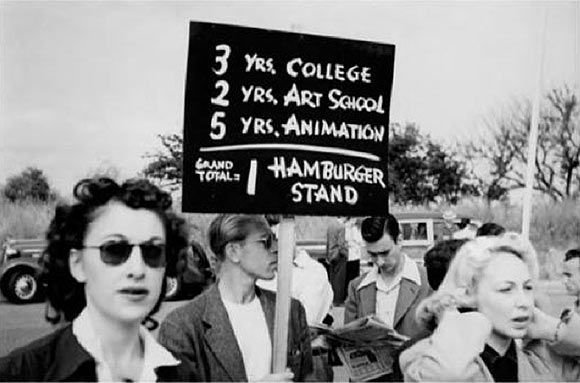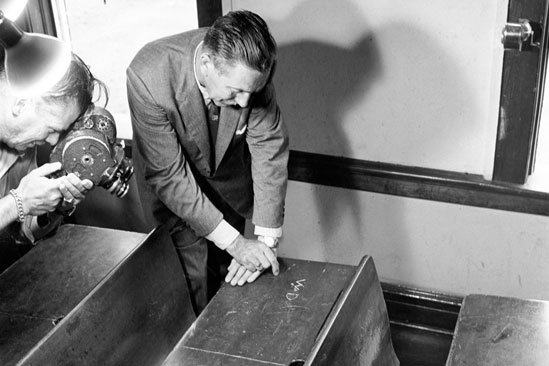Perhaps I’m a bad Disney fan, but there is admittedly a lot that I don’t know about that man who has influenced my life so much. Even though several books and movies have been recommended to me over the years, I’ve often let those sit on the shelf, instead choosing to go to Disneyland or do some work… so that I could go back to Disneyland. Because of this, I was excited to watch the American Experience: Walt Disney documentary that aired on PBS for two nights this week. While there was a good amount in the film that I was at least somewhat aware of, there were a few items that really opened my eyes.
Here are seven things I learned from the documentary:
7) Song of the South was always controversial
Whenever there’s a cry for the company to re-release Song of the South, there’s almost always use of the phrase, “it was a different time back then.” While literally no one can argue that, yes, anytime other than the time we’re in is indeed a “different time,” this excuse loses a lot of steam when you realize that the film’s backlash didn’t just start immediately after it was released but even beforehand! This isn’t to say that the film shouldn’t ever see the light of day or that it really is as racist as the critics say; I just find it interesting that the controversy it carries isn’t a post-Splash Mountain novelty.
6) Disney’s union woes go way back
When I moved to California in 2009, there had been frequent protests down Harbor Boulevard and the surrounding areas for a some time. These were typically led by the union that represented the hotel workers of the resort. I recall them even handing out “Shame on Disney” pamphlets and balloons (which kids happily took without realizing what they said) out front of the first D23 Expo.
While I had heard reference to “the strike” in relation to The Walt Disney Studios, I had mistakenly envisioned a SAG strike or a WGA strike, like we had only a few years ago. It wasn’t until I watched this documentary that I realized the strike was more or less studio specific and that Walt was very much against the unionization of his workers. I also had no knowledge of his fear of Communism and his part in the blacklisting of Hollywood (“He named names!”).
5) Some of the most beloved animated classics were flops
I knew that not all the Disney classics were hits, but it’s crazy to think of Pinocchio and Bambi as flops… Fantasia I can understand. Ironically, it was these films that cost the studio a ton of money while the shorts and other works we rarely see were the only thing that kept the company afloat. It makes you wonder what we’ll think of Tomorrowland in 50 years.
4) The company went public because they were out of money
Thanks to the aforementioned box office failure of Pinocchio, The Walt Disney Company went public just so they could stay in business. I don’t know if you follow the stock market much or track IPOs, but typically companies go public when they’re doing well and can have a successful launch on the stock market. The fact that Disney depressingly dragged themselves to the opening bell to avoid the auction block is kind of mind-blowing.
Even more mind-blowing is to think about what would have happened if the company had never gone public. In the short term, it may have alleviated some of the animosity that started the strike. But, in the long run, what if Disney was able to make decisions without having to answer to shareholders. I’ll let smarter people theorize and debate if this would have been a good or bad thing, but it’s fascinating to ponder.
3) Walt was aware that he had become a brand
One of the quotes attributed to Walt that I found interesting was, “I do things that Walt Disney wouldn’t do: Walt Disney doesn’t smoke. I smoke. Walt Disney doesn’t drink. I drink.” This sort of double life conundrum shows that Walt was very much aware that he was a brand and that brand was wholesome. However, while Walt’s crafted public image was self-imposed, many of the young actors on the channel that bears his surname are held to similar standards without as much knowledge of what they’re signing up for or the severity of it. This isn’t a defense of those teenagers or a criticism of Disney, but it’s clear that this precarious paradigm began with the man himself.
2) He adopted Marceline as his home even though he only lived there a short time
I knew that Walt was actually born in Chicago and had also lived in Kansas City, but I wasn’t aware that he only spent a small amount of his life in famed Marceline, Missouri. It makes you wonder if he choose to identify this as his home because of the inspiration he got from it or because he could, in some way, take a small town and put it on the map — much like he did with Anaheim, incidentally. This realization also made me question what places most people consider to be their “home.” Is it where you’ve lived the longest? Where your family is? Where you were born? Or just the place you loved the most?
1) People think “clean and safe” can be bad things
It may have been almost a throwaway line in the documentary, but one of the critiques of Disneyland was that it was too “clean and safe.” To some degree, I understand the similar argument that the Disney films were corny and, at times, overly wholesome, but, as it relates to Disneyland — a physical park — I find it really hard to say that those adjectives could have negative connotations. Would they prefer dirty and dangerous? Maybe those critics should try Dismaland (if they’re still alive, that is).
What did you think of American Experience: Walt Disney? Did you learn anything or was there something that surprised you? Let us know!



